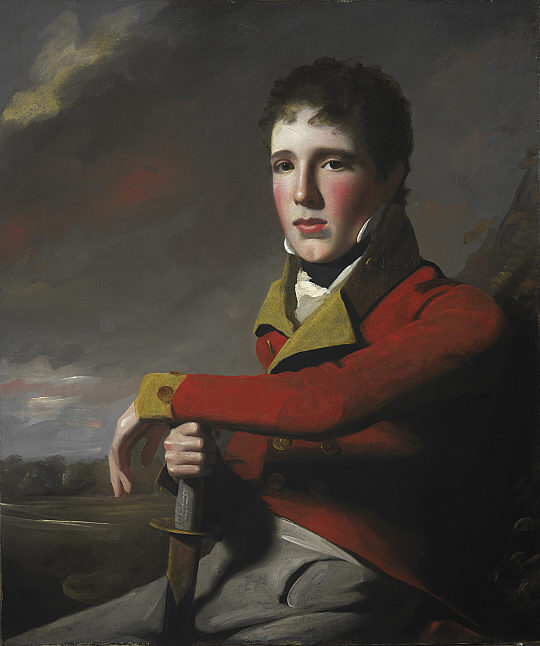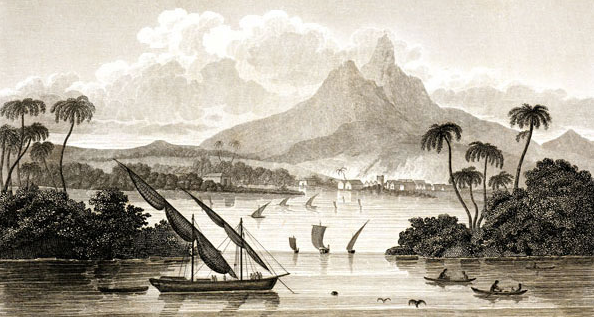
Name: Gregor MacGregor
Tagline: A Scotsman who, after a stint in the Napoleonic Wars, went off to South America to join the wars of independence.
Claim to Fame: Perpetrating several plots to enrich himself at the cost of others, including twice selling off land in a non-existent province.
Gregor MacGregor did one or two heroic things in his life. But mostly, he claimed that he had done great things, while really mostly enriching himself.
He started off in the English army in 1803, during the Napoleonic Wars. He quickly progressed to the rank of Lieutenant, and went to fight in the war.
In 1805 he married the wealthy daughter of a general, and quickly thereafter bought a promotion to the rank of Captain.
In 1809, MacGregor got into an argument with a superior officer. That led to him seeking his discharge from the army, which he did in May of 1810. Now, in May of 1811, his old regiment fought very well at a battle, earning them fame as well as the nickname, “the Die-Hards” – an association that MacGregor would not hesitate to flaunt, despite having had nothing to do with earning that name.
After a brief stay in Scotland, MacGregor and his wife moved to London, which is where his lies started to accelerate. He claimed to be a baronet, having succeeded to be chief of his clan. This helped him gain a respectable reputation in London.
But alas, in December of 1811, his wife died. Since most of his income had come through her family ties, that mean a significant reduction in pay for MacGregor.
Luckily for him, a new opportunity soon presented himself: the Venezuelan War of Independence! The independent government were looking to recruit veterans from the Napoleonic Wars to come help them fight for their independence from Spain. MacGregor decided to enlist!
I’ll skip lightly over much of his career in Venezuela. He did do one very noteworthy thing: after having landed with a small scouting force, he was cut off when a traitor forced the ship of the main commander, Simon Bolivar, to retreat. That sent MacGregor and his men on a long trek through the countryside to a friendly city, all the while fighting off the Spanish army. This may have been the only true heroical thing MacGregor did.
Later on, MacGregor was convinced that he should try to take Florida from the Spanish. So he went up to the United States to recruit men and raise money. The money he raised in return for promises of – pretty much fictitious – land in Florida, or the money back with interest. Then he sailed for Florida and quickly conquered Amelia, a little island settlement, populated especially by pirates and other criminals.
There he declared the republic of the Floridas, and raised his own flag over the city. But soon the Spanish gathered forces on the coast opposite of Amelia, and MacGregor got cold feet. He left the island in the hands of one of his officers – who ended up holding the island, and turning it over to the Americans.
MacGregor then sailed back to Britain, and there he raised an expeditionary force. He sailed back to South America, and managed to conquer the fortress of Bello. But instead of organising the defence of the place, he spent his energy coming up with an order under his own name. And so the Spanish managed to sneak up upon the place and enter it while the soldiers were practising in the courtyard – and MacGregor was in his bed. He supposedly threw his bedding out of the window, jumped after himself, then paddled on a raft to his ship. He almost drowned on the way, but was saved by one of his officers.
At a later instance, MacGregor landed troops to conquer the city of Rio de la Hacha. He said he would come lead them himself, but never did. Even when his flag flew over the city, he was convinced that it was a trick, and stayed aboard, even when one of his officers came out to get him. When he finally did come ashore, he held a lofty speech, declaring himself “His Majesty the Inca of New Granada.” Then he once again failed to properly defend the city, leading two of his officers to flee desert the city. Then, when the Spanish arrived at the city, MacGregor himself deserted, leaving his men to be slaughtered by the Spanish.
On his way back to Britain, he stopped in with the Mosquito people (yes, there were a Mosquito nation). There he was granted an area of land – mostly marshy, inhospitable land.
MacGregor dubbed his land Poyais, and then he went home to Britain. In Britain he claimed to be the “Sovereign Prince of Poyais”, appointed officials and presented credentials to the king.
Then he started advertising the land of Poyais. He wrote a 355 page guidebook, gave interviews and talking about what a great place Poyais was. And then the good news: there was loads of land in Poyais, ready for an intrepid settler. So when he started selling land there, it sold like hot cakes. He even sent off a shipload of settlers to Poyais – despite the fact that such a place did not exist.

The ship with the settlers arrived to an inhospitable area of marshland, with a local king who wanted nothing to do with them. When the rainy season started, they were plagued by malaria and other tropical diseases. By the end of the whole ordeal, about 180 out of 250 aboard the first ship were dead. And five more were on their way, though those were turned back by the Royal Navy.
But MacGregor was not around to see the return of the settlers. He had gone off to Paris – there to do the whole thing again. He was caught, though, and brought to trial – only to be acquitted by the reading of a 5,000-word fictitious account of the events.
Then back to London, where he did another Poyais-scheme – this time selling bonds, and later selling land to lumber companies. Finally, he returned to Venezuela, where he became a respected member of society and – despite his many military debacles – was buried with military honours.
How would I use him: There are several good options for using Gregor MacGregor in a story. He would be a perfect antihero for a story about war or fraud. Or what about a murder mystery: Who killed Gregor MacGregor out of these five or six people he betrayed?
Also, if you ever want an idea of what kind of crazy schemes people fall for – well, look no further!